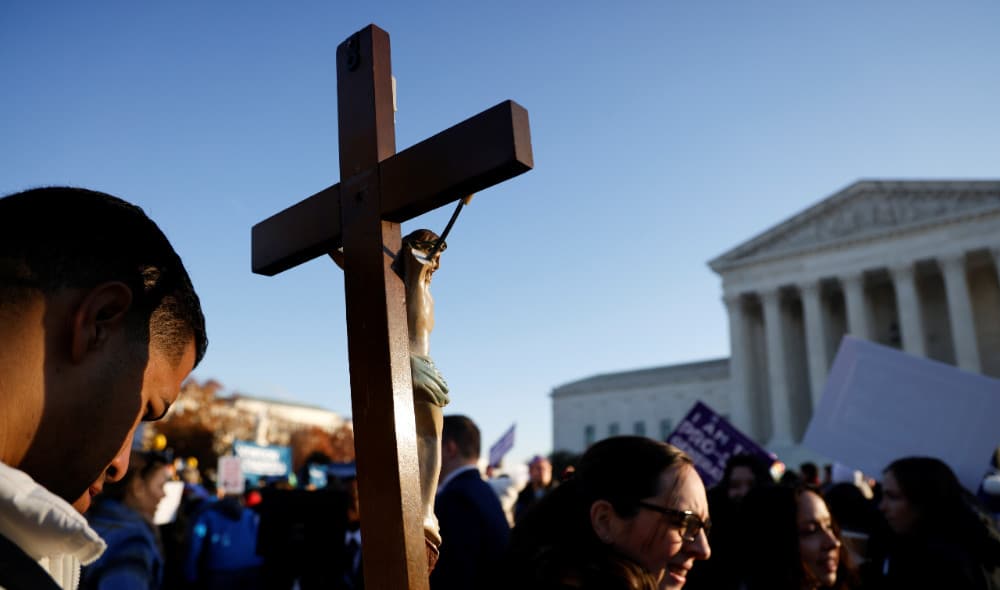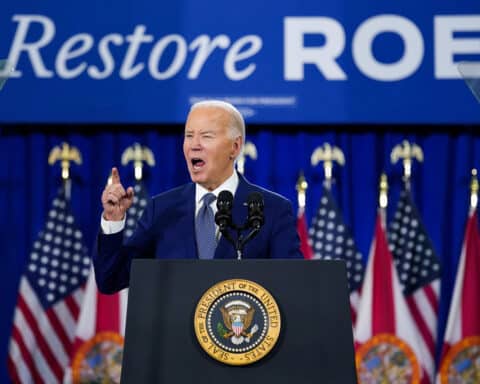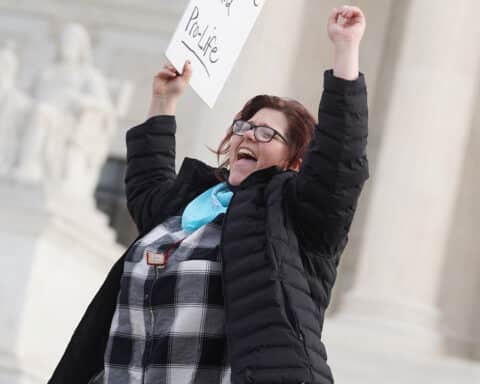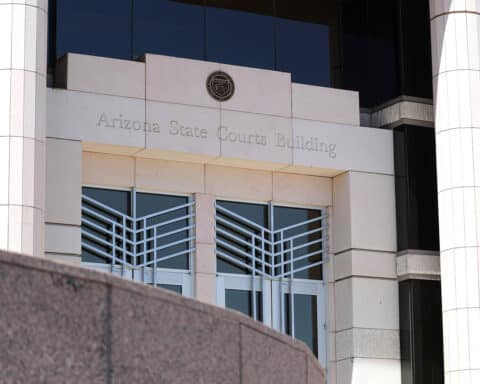Desperation pretty clearly is the explanation for the shocking leak of a purported Supreme Court decision striking down the court’s principal pro-abortion rulings. Most likely, an abortion supporter or supporters at the court gave the document to the online news site Politico hoping the resulting outcry would scare the court’s pro-life majority into backing down.
The pro-life group Americans United For Life look at the intention behind the leak this way:
“The implicit intent is to pressure and manipulate members of the court to alter their votes or otherwise water down the language of the final opinion.”
The Supreme Court has strict secrecy rules governing its internal deliberations, so that the leak came as a genuine shock to court observers. But like many maneuvers that turn out to be too clever for their own good, this one also could have a result contrary to what the leaker or leakers intended by moving the pro-life justices to take an even tougher stand against Roe v. Wade, the court’s 1973 decision abruptly legalizing abortion, and Planned Parenthood v. Casey, the 1992 ruling in which the court upheld Roe.
As matters stand, however, the Supreme Court so far has not decided anything. To understand the present situation, it is necessary to keep the chronology of events in mind.
The court heard oral arguments last Dec. 1 in a case from Mississippi that many see as the potential vehicle for a new, pro-life approach on abortion. The case, Dobbs v. Jackson Women’s Health Organization, involves a state law that bars most abortions after 15 weeks of pregnancy.
Following the oral argument, the justices met privately to share views on how the case should be decided and begin the process of drafting opinions and lining up support for them among their colleagues.
The document leaked to Politico — attributed to pro-life Justice Samuel Alito — looks to some court-watchers less like the draft of a proposed final opinion and rather more like an earlier internal document sketching out arguments to be made at greater length in a ruling that would overturn Roe and Casey.
According to Politico, the document was in fact circulated among the justices last February — well over two months ago. That means other justices have had ample time to weigh in with criticisms and suggestions of their own, making it likely that the process of opinion writing is now well beyond the stage of the leaked draft. If so, the February version must be read with the proviso that the final result could look very different.
The document says Roe v. Wade was “egregiously wrong from the start. Its reasoning was exceptionally weak, and the decision has had damaging consequences. And far from bringing about a national settlement of the abortion issue, Roe and Casey have enflamed debate and deepened division.”
As for the argument that Roe and Casey are legal precedents that should not be overturned, the draft says the legal doctrine of stare decisis (“let the decision stand”) “does not compel unending adherence” to the earlier rulings’ “abuse of judicial authority.”
The document goes on to emphasize that the effect of a ruling overturning the abortion decisions would involve only abortion and not other Supreme Court rulings of recent years on homosexuality and same-sex marriage.
The Alito document is said to have the support of Justices Clarence Thomas, Neil Gorsuch, Brett Kavanaugh and Amy Coney Barrett. According to an unattributed Wall Street Journal report, Chief Justice John Roberts has sought privately to persuade Justice Barrett to switch her vote to a more moderate approach that he apparently favors, such as allowing states to set some restrictions on the performance of abortions.
However the court’s current deliberations turn out, it is safe to assume that its three liberal members — Justices Stephen Breyer, Sonia Sotomayor and Elena Kagan — will vote in support of abortion.
The Alito document declares that the time has come “to return the issue of abortion to the people’s elected representatives.” In fact, the process of doing that is already well along and likely to increase in the months ahead.
Already some states have adopted laws like the Mississippi statute barring abortion after the 15th week of pregnancy. Texas has a law prohibiting abortion after the fetal heartbeat begins at around six weeks. Some states are weighing measures intended to prevent residents from going out of state to have an abortion, while states like California and Connecticut have declared themselves refuges for out-of-state abortion seekers.
At the national level, the Senate and House will see ongoing debate over competing pieces of legislation that seek either to ban abortion entirely or “codify” abortion as a right recognized in federal law, something that President Joe Biden supports doing.
Given the closely divided state of both the Senate and the House, neither kind of measure is likely to pass right now, but the issue is sure to be fought out in the fall elections. Depending on which way the voting swings, it could be a new day for legislation either restricting or protecting abortion when a new Congress convenes next January. Next year, too, abortion is sure to be an issue during the run-up to the presidential election in 2024.
If the Supreme Court does indeed strike down the Roe and Casey decisions, another immediate result will be renewed calls for “court-packing” — increasing the number of justices from the present nine to whatever it might take for a reconstituted pro-abortion majority to restore the reign of abortion on demand via a new ruling or rulings.
The presidential commission established by Biden to consider proposals for changing the court did not support court-packing, and Justice Breyer, the present court’s senior liberal who will retire at the end of this term, has called it a bad idea. But that won’t keep the abortion lobby from reviving the idea if it loses big in the Dobbs case.
Russell Shaw is a contributing editor for Our Sunday Visitor.





